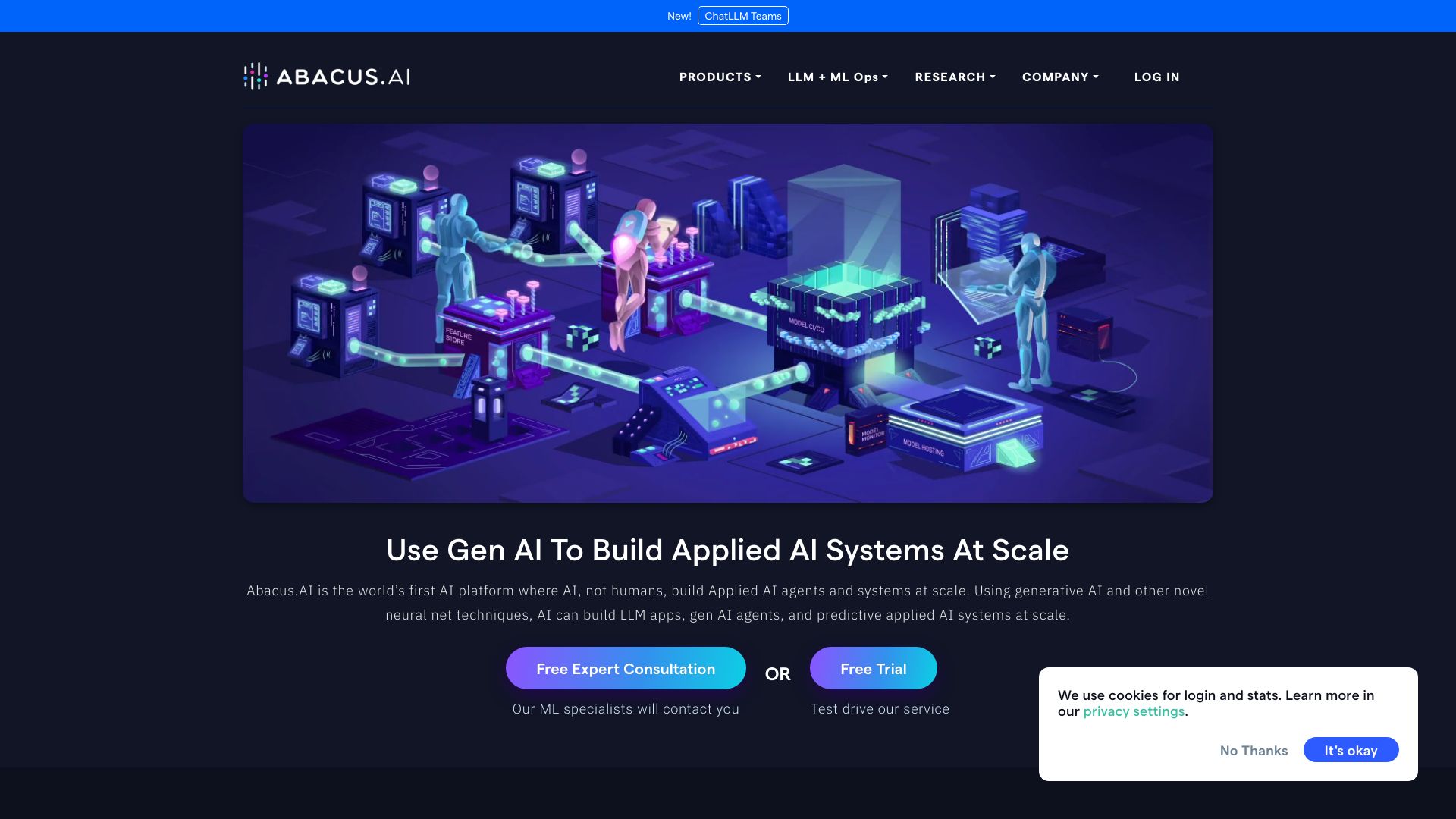- Home
- AI Image Recognition
- Abacus AI

Abacus AI
Open Website-
Tool Introduction:Embed applied AI fast—agents, chatbots, forecasting, enterprise automation.
-
Inclusion Date:Oct 21, 2025
-
Social Media & Email:
Tool Information
What is Abacus.AI
Abacus.AI is an end-to-end AI platform that helps organizations embed cutting-edge intelligence into products and workflows. Its core value centers on an “AI Engineer” that orchestrates data pipelines, model selection, and deployment to build applied AI systems quickly. Teams can create custom chatbots and AI agents, run forecasting and demand planning, deliver real-time personalization, and ship predictive models via APIs. By unifying experimentation, evaluation, and operations, Abacus.AI shortens time-to-value and enables enterprise-scale automation with AI building AI.
Abacus.AI Key Features
- AI Engineer orchestration: Configure end-to-end workflows that handle data ingestion, model training, evaluation, and deployment with minimal manual glue code.
- Custom chatbots and agents: Build domain-specific assistants that answer questions, route tasks, and automate actions across business processes.
- Forecasting and time-series: Create demand, revenue, and capacity forecasts with automated feature generation and backtesting.
- Personalization and recommendations: Deliver tailored content, offers, and ranking to improve conversion and engagement.
- Predictive modeling: Train, compare, and serve classification/regression models for risk, churn, LTV, propensity, and more.
- Evaluation and monitoring: Track model performance, drift, and quality to maintain reliable outcomes over time.
- API-first deployment: Integrate models and agents into applications via secure APIs and SDKs for rapid production rollout.
- Enterprise controls: Access controls, auditability, and governance features for regulated and large-scale environments.
Who Should Use Abacus.AI
Abacus.AI suits product and engineering teams embedding applied AI into apps, data science and MLOps groups industrializing models, operations teams automating workflows with agents, and business units (marketing, finance, supply chain, customer support) seeking forecasting, personalization, or predictive insights.
How to Use Abacus.AI
- Define your use case (chatbot/agent, forecasting, personalization, predictive modeling) and success metrics.
- Connect data sources and configure schemas or knowledge assets required for training and inference.
- Set up an AI Engineer workflow to automate preprocessing, model selection, and evaluation.
- Train and validate models or agent behaviors; review offline metrics and sample outputs.
- Deploy to production via APIs/SDKs or embed UI components; configure scaling and access controls.
- Monitor performance, drift, and user feedback; iterate on data, prompts, and parameters.
- Automate end-to-end jobs and integrate with downstream systems to operationalize outcomes.
Abacus.AI Industry Use Cases
E-commerce teams use Abacus.AI for real-time recommendations and personalized ranking. SaaS and support organizations deploy custom chatbots to deflect tickets and surface knowledge instantly. Supply chain and retail planners run demand forecasting to optimize inventory and replenishment. Financial services teams build propensity and risk models to improve underwriting, offers, and retention strategies.
Abacus.AI Pros and Cons
Pros:
- End-to-end platform that accelerates from data to production.
- Covers key use cases: chatbots, agents, forecasting, personalization, and predictive modeling.
- API-first deployment and orchestration streamline integration.
- Evaluation and monitoring support reliable, governed operations.
- Helps reduce time-to-value and operational overhead for AI initiatives.
Cons:
- Impact depends on data quality, coverage, and freshness.
- Complex enterprise setups may require careful governance and change management.
- Advanced configurations can have a learning curve for non-technical users.
- Operational costs can rise with large-scale training and inference workloads.
Abacus.AI Popular Questions
-
Question 1: What problems does Abacus.AI solve?
It streamlines building and deploying applied AI—chatbots, agents, forecasting, personalization, and predictive models—so teams can move from experimentation to production quickly.
-
Question 2: How is Abacus.AI different from building in-house?
It provides an orchestrated “AI Engineer” workflow, evaluation, and deployment tooling out of the box, reducing custom glue code and operational overhead.
-
Question 3: Can I use my private data?
Yes. You can connect your data sources to train models or enable agents and chatbots that operate on your proprietary knowledge.
-
Question 4: How do I integrate models into my app?
Deploy models or agents and call them via secure APIs or SDKs, then monitor performance and iterate based on user feedback.
-
Question 5: What use cases show fastest ROI?
Common quick wins include customer support chatbots, demand forecasting for inventory, and personalization that lifts conversion and retention.



